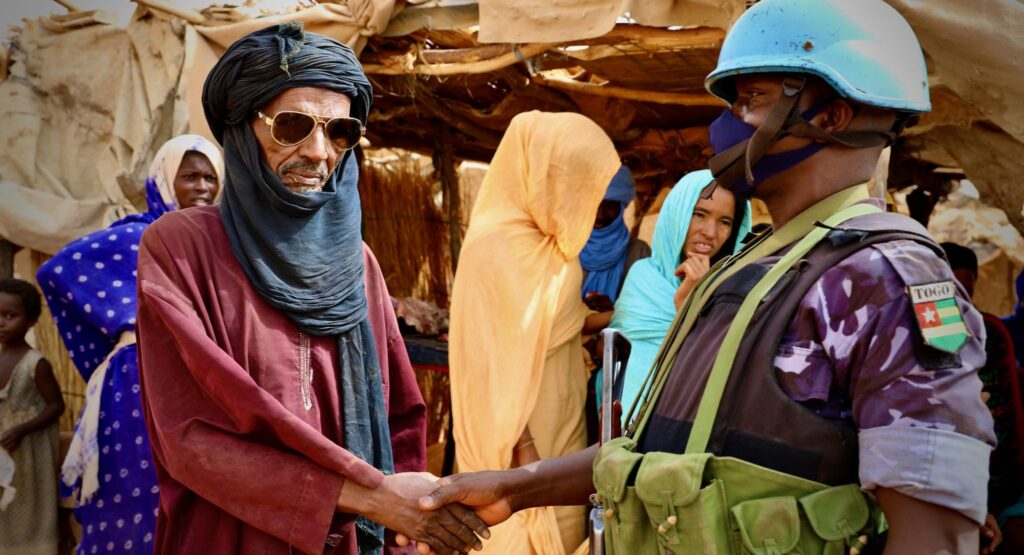
• 2023 terrorism deaths rose by 8,352, representing 22% more than 2022
• Attacks deadlier with 2.5% in 2023 against 1.6 % in 2022
• Nigeria recorded its first increase in terrorism in three years in 2023, with total deaths rising by 34% to 524.
• Sahel region most affected, with almost half of all deaths at 26% attacks
• Burkina Faso suffers worst impact, with deaths rising by 68%
• Lack of political will to deal with causes, consequences fueling terrorism, says Prof Oseni
• Ugwu: There’ll be progress in combating terrorism when countries in Sahel effectively manage political leadership
Terrorism in 2023 has remained a global threat as a record of 8,352 deaths representing 22 per cent increase from the previous year remains the highest, since 2017.
According to the Global Terrorism Index (GTI) 2024, the central Sahel region has conclusively overtaken the Middle East as terrorism’s epicentre with Islamic State (IS) and Jamaat Nusrat Al-Islam wal Muslimeen (JNIM), a franchise of Al-Qaeda, being the most active terrorist organisations.
The region was the most affected, accounting for 26 per cent of attacks in 2023.
Notwithstanding the concerns, the GTI report noted that while deaths from terrorism has reduced in the last few years, there was an uptick last year, amid concerns about rising violent conflicts outside of terrorism as well as ability of the Federal Government to focus on sustained peace initiatives in Borno State, allocate adequate resources to defector rehabilitation programs, and enhance services in rural areas to weaken recruitment efforts.
Indeed, the report stated that the death of Boko Haram leader Abubakar Shekau in May 2021
has intensified conflicts between jihadist factions.
Nigeria, it noted, is among the 10 countries fiercely affected by terrorism. The rest are Israel, Burkina Faso, Mali, Pakistan, Syria, Afghanistan, Somalia, Niger and Myanmar.
Nigeria recorded its first increase in terrorism in three years in 2023, with total deaths rising by 34 per cent to 524.
This year marks Nigeria’s highest death toll since 2020, driven by a surge in conflict between ISWA and Boko Haram.
If the conflict between these two groups was excluded, terrorism deaths, the report said, would have declined by 18 per cent.
Also, civilians were the most targeted group for the second consecutive year in 2023, followed by military personnel.
Civilians were targeted in over a quarter of all attacks, followed by military personnel at 21 per cent and law enforcement also at 21 per cent.
“ISWA has been Nigeria’s deadliest terrorist group for each of the past four years. It accounted for 53 per cent of the nation’s terrorism-related fatalities and 37 per cent of terrorist incidents in 2023.
“Even though the number of ISWA terrorist attacks decreased slightly in the past year, the death toll rose by 27 per cent to 276 deaths, the highest amount in the past three years.
“On average, ISWA attacks became deadlier in 2023, causing 5.2 fatalities per attack, an increase from 3.6 in 2022. The conflict between ISWA and Boko Haram intensified in 2023, with ISWA attacks resulting in the death of 167 Boko Haram militants, the most since the two groups split in 2016.

“Boko Haram recorded its deadliest year since 2020, with 29 attacks leading to 151 deaths, a significant rise from the nine attacks and 72 deaths recorded in the previous year. The majority of Boko Haram’s attacks targeted civilians, but almost a quarter of their fatalities occurred during confrontations with ISWA,” it stated.
The report further noted that the conflict between Boko Haram and ISWA has resulted in a significant escalation in terrorism in Borno State, which experienced an increase of 63 per cent in terrorism deaths compared with the prior year.
Attacks in the state, it stated, also increased from 48 to 73 respectively, an increase of 52 per cent.
“The deadliest terror attack of the year occurred in Borno State, when 60 terrorists were killed in a battle between ISWA and Boko Haram gunmen in August. Boko Haram reportedly lost more fighters than ISWA in the attack”, it added.
Burkina Faso suffered the worst impact from terrorism in 2023, with deaths increasing by 68 per cent (1907 deaths) despite attacks decreasing by 17 per cent.
Terrorism in the country has deteriorated every year since 2014 as neighbouring Mali and Niger also deteriorated in 2023.
Sub-Saharan Africa (MENA) and South Asia accounted for 94 per cent of deaths from terrorism in 2023, with sub-Saharan Africa alone accounting for just under 59 per cent of all fatalities.
The Sahel accounts for almost half of all deaths from terrorism globally. The impact of terrorism has been falling in MENA since its 2016 peak, with deaths down by 66 per cent and incidents by 72 per cent.

Though the deadliest terrorist incident in 2023 was the October 7th Hamas-led attack in Israel, which killed 1,200 people, the number of terrorism incidents fell in the Middle East, along with North Africa, Europe and North America.
Pakistan recorded the most incidents of any country, with 490 attacks that resulted in 689 deaths.
This is the fourth successive year where both deaths and incidents have increased in the country.
Iraq recorded the largest improvement in the last decade with deaths from terrorism falling by 99 per cent since its peak in 2007, to 69 in 2023.
Terrorism incidents in Western democracies recorded a drop of 55 per cent compared to the previous year. There were 23 attacks that resulted in 21 fatalities, marking a 15-year low.
However, America recorded 76 per cent of these fatalities from seven attacks. Five of these attacks were linked to individuals with far-right beliefs yet none had an affiliation with a far-right group. But religiously motivated terrorism dropped significantly.
The GTI, produced by Institute for Economics & Peace (IEP), highlights that of the 3,350 terrorist attacks recorded during the time under review, 54 per cent were attributed to a group.
Countries with highest attacks not attributed to a group were Myanmar, Burkina Faso, Mali and Pakistan. The report added that there was a 56 per cent increase in the average number of people killed per attack, the worst rate in almost 10 years.
IS and its affiliates remained the world’s deadliest terrorist group, responsible for 1,636 deaths, despite its attributed deaths falling by 17 per cent. IS was followed by Hamas, JNIM, and Al-Shabaab.
Together, they were responsible for over 75 per cent of terrorism-related deaths globally. A decade ago, they were responsible for less than 25 per cent.
In 2023, IS attacks occurred in six of the nine GTI regions; Asia-Pacific, Europe, MENA, sub-Saharan Africa, Russia, Eurasia and South Asia.
In the Middle East, Syria was the country most affected by IS attacks. It recorded 224 attacks, an increase from 152 in 2022, and a quarter of all IS related deaths.
To arrive at this data, the international institute deployed multiple factors, such as; number of incidences, fatalities, injuries and hostages, and combined it with conflict and socioeconomic data to provide a holistic picture of terrorism.
Founder & Executive Chairman, IEP, Steve Killelea, said terrorism has a uniquely disturbing psychological and social impact intended to traumatise the whole of society, rather than the individual.
“The last twelve months resulted in the most lives lost to terrorism than in any period since 2017. Conflict remains the primary driver of terrorism, yet most wars in the 21st century have been unwinnable and very costly.
“Terrorism also thrives in areas of political instability. it is imperative that current political tensions and minor conflicts do not escalate and that current conflicts are resolved.
“Globally, we have seen real gains in recent years in our fight against terrorism, particularly in Western democracies. However, left unchecked regional instabilities could fan the flames of a new wave of terrorism,” he said.
Killelea advised that global policymakers should make more efforts to address the current global conflicts.
Conflict Manager and International Affair Analyst, Aladetan Abiodun, attributes the increase in terrorism, especially in the Sahel to persistently weak governance, characterised by corruption, democratic backsliding, legitimacy deficits, and human rights violations.
He noted that many countries in the region share similar internal dynamics of inequality —state power tends to be concentrated in southern, urban regions while rural, northern areas remain underdeveloped and ripe for exploitation by extremist groups.
“So, Sahel countries are consistently ranked high on the Fragile State Index, particularly Chad, Mali, and Nigeria,” he added.
According to him, terrorism sometimes is linked with religion. When a political struggle is integrated into the framework of religious struggle, failure in the process is equated with spiritual failure, which for a highly committed devotee, is worse than their own death or the deaths of innocent civilians.
He suggested that in the face of terrorism, Nigeria has a sleeping government, urging the government to stand up to the occasion.
Abiodun advocated that active counter-terrorism measures, one that includes detection of potential acts and the response to related events be implemented to curb the crisis.
“Building a counter-terrorist plan involves all segments of a society or many government agencies. The way forward is that appropriate government organisations need to understand the source, motivation, method of preparation, structure of their cell system, interception of communications, and tracing of persons in such groups.
“Good intelligence is at the heart of such preparation, as well as political and social understanding of any grievances that might be resolved,” he stated.
Foreign Affairs Analyst, Henry Chibuike Ugwu, believes that there is a correlation between a breakdown of the rule of law, political corruption, ineffective democracy, and the rise of terrorism.
He stated that many countries in the Sahel have a strong presence of violent non-state actors, adding that political instability and failure of leadership have further exacerbated terrorism in the region.
“A few countries in the Sahel have recently experienced military coups. In most cases, the coup plotters have justified their unconstitutional takeover of government by blaming the political class for wanton corruption and abuse of office.
“This situation is further complicated because several corruption indices cogently implicate many public institutions in most countries in the Sahel,” he declared.
Ugwu suggested that supranational and intergovernmental organisations in the region like the African Union (AU) and the Economic Community of West African States (ECOWAS) should prioritise managing political leadership in the Sahel.
“Those organisations must invest in building the capacity of electoral bodies in the region to conduct credible elections and create an enabling environment for the press to thrive.
“It is only when the countries in the Sahel begin to effectively manage political leadership that we will see progress in combating terrorism in the region,” he said.
Associate Professor, Political Science, Lead City University, Dr Tunde Oseni, said most humans either at state or interpersonal level agree that terrorism is evil.
He alluded to the fact that terrorism is fueled by poverty, ignorance and coercion, adding that lack of political will on the part of the government to deal with causes and consequences of terrorism contribute to the menace.
“Some argue that poverty is the cause of terrorism, which is not always the case. There are individuals who are not economically poor but involved in terrorism. If one is ignorant of his actions or consequences, it amplifies the likelihood to perpetuate evil acts. At the broader level, it is also the role of state actors.
“We can ensure that people with tendencies are prevented from acting and at the government level, in the case of existence, try to de-escalated their potential to continue terrorism,” he pointed out.
According to him, states have bigger roles to play in countering terrorism.
In counter terrorism, he said, there are two broad categories: kinetic and non-kinetic strategy.
Kinetic, he explained, indicates using force for force, while the other allows for negotiations.
He added that simultaneous and strategic use of these two approaches can minimise growth of terrorism across the globe.
Oseni emphasised that a combination of both approaches is key to curbing terrorism as there are no fixed rules in getting results, adding that there is the need for a functional justice system that would adequately deal with those contradicting the laws.
His words: “The growing trends of terrorism around the world requires the actions of stakeholders to educate individuals with potentials of becoming terrorists to re-orientate them.
“They need social and positive religious education. Any religion practiced must give psychological, emotional tolerance for others.”












